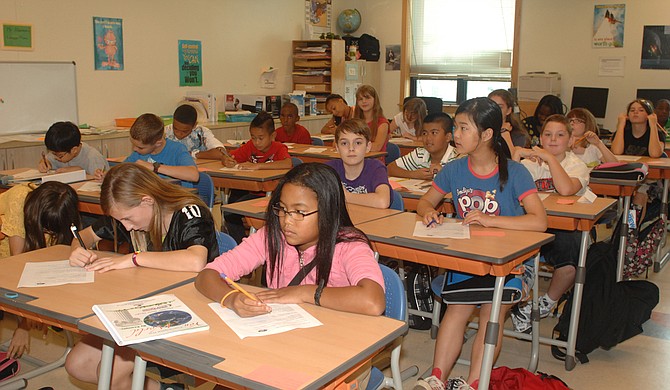A focus on education early in a child's life would be important to improving the status of Mississippi's children. Mississippi does have an Office of Early Childhood Education that opened in January and has also started a Pre-K collaborative 4-year-olds program. Photo courtesy Flickr/USAG Humphreys
Mississippi ranks 50th overall in child well-being, according to the 2015 Kids Count Data Book the Annie E. Casey Foundation released today. The study researched state development in economic, education, health and family sectors. Mississippi ranked 50th in all categories except education, in which it ranked 48th.
Dr. Linda H. Southward, director of Mississippi Kids Count, a state-based family and children-focused research center, said that Mississippi has improved in nine of 16 specific development areas, but not at a rate that would boost the state out of the bottom rank. Southward said the child poverty rate is not helping: One in three children in Mississippi lives in poverty, compared to one in five living in poverty nationally.
Southward said all the study's subject areas are connected.
"It really is multiple areas that are impacting our rankings, but if you have to point to two, I think education and economic development go hand-in-hand," she said.
Southward said a focus on education early in a child's life would be important to improving the status of Mississippi's children. Mississippi does have an Office of Early Childhood Education that opened in January and has also started a Pre-K collaborative 4-year-olds program. Southward pointed to these improvements as signs of focusing on a child's education from the beginning—not when it's too late. She also admitted that so far, only 1,800 of the 44,000 4-year-olds in the state were enrolled in the program.
Southward believes that we have to make improving children's chances for success a priority.
"We have to start very early, working with families and children," she said.
There are things that communities and families can do at a local level. Southward suggested that communities should assess the quality of their early childhood education offerings, explore programs, encourage attendance and make sure kids are reading in the summer.
At Mississippi Kids Count, Southward said the organization has found that economically disadvantaged children have lower reading levels than their more affluent peers.
The 2015 data book found that 286,000 children in the state are living with parents who lack secure employment.
"Education is clearly an economic-development issue," Southward said.
Until Mississippi can get more children out of poverty with employment for their parents, the educational development will likely stay behind, too.
The Casey Foundation report found that more high-school kids are graduating on time than in 2008, but 12 percent of teens are not working or in school at all.



Comments
Use the comment form below to begin a discussion about this content.
comments powered by Disqus